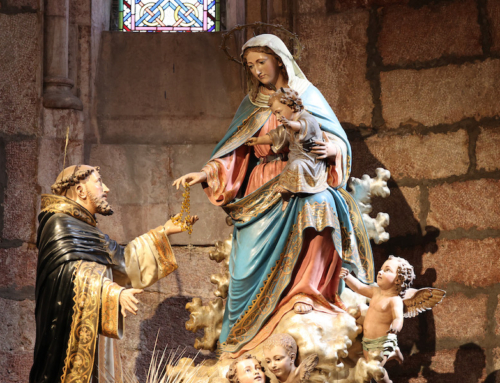Catholics believe in the existence of angels as a truth of faith, because they make many appearances throughout Sacred Scripture. In the Old Testament, God appointed angels the sentinels of the gates of Eden after the Fall, sent an angel to save Isaac from Abraham’s knife, and dispatched an angel to aid Tobias on his journey, just to mention a few.
Furthermore, in the Gospel accounts angels proclaim the Good News of Jesus Christ through some of Scripture’s most provocative lines. At Christ’s birth the angels sing, “Peace to men of good will,” at the empty tomb an angel asks the disciples, “Why do you seek the living among the dead?” and at Christ’s ascension an angel asks, “Men of Galilee, why are you standing there looking at the sky?”
Angels have clearly been present and active in the past as part of God’s self-revelation, but what import do they have for us today? Why do angels matter to you and me? The constant stream of new books about angels suggests that they arouse our curiosity and wonder somehow. But why?
Scripture gives us many reasons to revere angels, and theologians reflecting on their appearances in Revelation have given us even more. Saint Thomas Aquinas gives us a simple reason why we would be foolish to ignore the angels: there are so many of them. Regarding how many angels there are, he says “that the angels, even inasmuch as they are immaterial substances, exist in exceeding great number, far beyond all material multitude.”
Additionally, angels are powerful guardians. In Scripture Judith attributes her heroism to an angel who watches over her. When Judith slew Holofernes, she explained that it was by an angel’s help, for she says, “as the Lord lives, his angel is my keeper.” Thus, St. Thomas teaches that God assigns to every person a guardian angel as protector and shepherd.
Take as another example the prophet Daniel, who after seeing an apocalyptic vision, grew fearful. But Daniel was visited by a principality (a type of angel who watches over a kingdom) who comforted him. Daniel thus says, “And when he spoke to me I was strengthened and said [to him], ‘Let my Lord speak, for you have strengthened me.’” This illustrates another distinguished capacity of angels: to reassure and encourage us.
The Hebrew word for ‘angel,’ mal’ak, means ‘messenger,’ perhaps because Scripture often depicts them crossing the expanse which divides heaven and earth to bring the news of God’s work to men. It is important to know, however, that Saint Augustine, and Saint Gregory following him, teach that angelus est nomen officii (“angel is the name of the office”). This means that acting as a messenger is neither essential to an angel’s being, nor is it an angel’s primary task. Or in other words, “messenger” is what angels do and not what they are. Because angels are so much loftier beings than we are, we cannot understand exactly what any given angel is in himself; instead, we have to speak of what he does, how he is made known by his actions.
Finally, but most significantly, consider what the Psalmist says: “you have made man little less than the angels.” Angels are masters of the spiritual life, and we are their apprentices. Love — truly willing the good of another — is the angels’ primary task. As Peter Kreeft says, angels are true altruists. They teach others, namely, us human persons, how to love more perfectly. And it behooves us to listen to what they teach, because the angels already do what we hope someday to do: look upon the face of God.
Image: Fra Angelico, San Marco Annunciation







